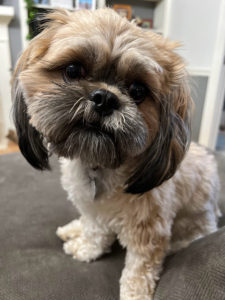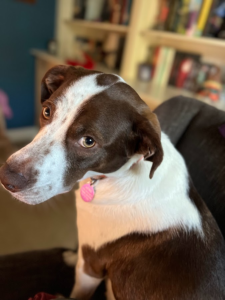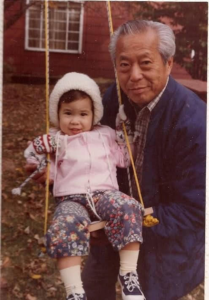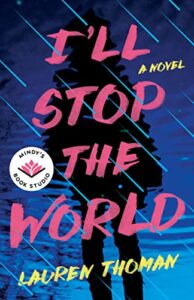Today Behind The Words welcomes Lauren Thoman, author of I’LL STOP THE WORLD, a time travel mystery!
First, tell our readers a bit about yourself.
Hello, I’m so glad to be here! I’m originally from a suburb of Philadelphia, PA, although I’ve lived outside of Nashville, TN for over a decade now. (I still crave cheesesteaks, Wawa hoagies and coffee, and Rita’s water ice on practically a daily basis, though. You can take the girl out of eastern PA, but you can’t take the eastern PA out of the girl.) My husband and I will be celebrating our 20th anniversary this summer, and we have two teenagers who are currently finishing up their freshman and junior years of high school.
We’ve also got two dogs–an Aussie/lab mix named Astrid, and a Shih Tzu named Fezzik–and foster dogs as well, so it’s not unusual for us to have a whole pack roaming around our house. Both Astrid and Fezzik were pandemic puppies, and are as weird as one might expect given that origin story. We also have a ridiculous number of fish. Don’t ask me to count; just think about what a reasonable number of fish would be and then quadruple it. Twice.
How long have you been writing and is it your full time job? If not, what is your ‘real world’ job?
I’ve been writing for about… eleven years now, I think? It feels like a long time, but is short compared to so many other authors who have been writing since they were kids! That said, I wrote my first book when my youngest was in preschool, and I now have two high schoolers, so that really puts it in perspective.
Yes, writing is more or less my full-time job now, although it’s a little hard to define since I haven’t held an actual in-office full-time job since before I had kids. Before I sold I’ll Stop the World, I was contributing regularly as a freelancer to a number of pop culture sites, such as Looper, Collider, Vulture, and Parade, which probably added up to a full-time job (sometimes more). Now my focus is on writing books, although I’m still doing a bit of freelancing on the side.
the World, I was contributing regularly as a freelancer to a number of pop culture sites, such as Looper, Collider, Vulture, and Parade, which probably added up to a full-time job (sometimes more). Now my focus is on writing books, although I’m still doing a bit of freelancing on the side.
What does your typical writing day look like?
Is there such a thing as a typical writing day? Assuming it’s during the school year, I wake up with my kids and see them off to school. I consume a lot of coffee. I feed the dogs. If I’m in a good season of self-discipline, I might do a workout or take a walk.
Come mid-morning, on some days, I will meet up with friends at a coffee shop or library to write, and possibly go out for lunch in the middle of the day (we tend to conveniently pick work spots that have taco places nearby). But most days, I just sit at my desk at home (probably with a dog wedged into my chair behind me) and try to work while the kids are at school. I tend to spend my mornings on more administrative tasks, like catching up on emails and getting organized, because my brain truly hates being creative in the mornings. I’ve tried for years and it just refuses. After lunch is when I really try to buckle down and get some words in until it’s time to pick the kids up from school and shuttle them to all their various after-school activities. Some days I come away with pages of solid gold. Others I wind up with literally nothing. And of course, stuff like doctor’s appointments and vet visits and other grown-up nonsense will always find a way to wedge itself into the cracks.
Tell us about your latest release.
I’ll Stop the World is a multi-point-of-view time travel mystery about a modern teen who finds himself inexplicably transported back to the year 1985, one week before the deaths of his grandparents under suspicious circumstances. The first person he meets in 1985 is a teenage girl who convinces them that he must be there for a reason, and that reason is probably to prevent their deaths. But considering their deaths are still a cold case in 2023, solving the crime before it happens is a lot easier said than done.
The story is told from both teen and adult perspectives, and deals with themes of fate, forgiveness, and second chances. It’s all about the ways we affect one another, both intentionally and inadvertently, and the impact we all have on the world around us. I hope it’ll entertain and surprise readers, and maybe even make them laugh and cry a bit.
What inspired the idea for this book?
I’ve always loved time travel stories, so all sorts of books and movies and TV shows played into the original concept of I’ll Stop the World, but the one that had the most impact was Back to the Future. I was thinking about how fortunate Marty was to have Doc Brown there in 1955 to tell him what to do and how to do it, so he always had a very concrete goal and little reason to doubt he was on the right path. I wondered what Marty would’ve done if Doc hadn’t been around, and started playing with the idea of a teen thrown out of his time, and being completely unequipped for it. Everything else stemmed from that.
Which of the characters do you relate to the most and why?
Each character has a piece of me in them: Justin got my sense of humor and (unfortunately for him) executive dysfunction, Lisa got my people pleasing oldest child syndrome, Karl got my childhood insecurity and awkwardness, Diane and Veronica got my hopes and hangups about being a parent. But the one that is most like me is definitely Rose, who starts out as essentially the person I was in high school. I didn’t intentionally build her after me, but that’s just how she came out. Ultimately, though, the arc she goes through in the book took her in a very different direction than my teenage years did. I took a lot longer to get there. So in a way, she’s my teenage do-over, if I’d been a little more introspective, a little more open-minded, and a little less afraid of confrontation.
Would you and your main character be friends?
I’m not sure. Justin is exactly the type of disaster boy with a heart of gold that I did tend to romanticize in high school, but I’m not sure we actually would’ve had enough in common to hang out (I was a band, chorus, and theater kid, through and through, and Justin has probably never even wandered into that wing of the school). Rose and I definitely would have gotten along, but again, I’m not sure if we would have had many overlapping interests. I think we probably would have been good classroom acquaintances, and great project partners, but may not have reached Friday night sleepover levels of friendship.

What part of the book was the hardest to write?
The middle. I knew the ending very early on in the process, which you’d think might make building up to it easier, but it did not. The beginning also came fairly quickly (although a lot of what’s currently included in the first third of the book was originally in the middle–a lot of the sequencing of events changed during the rounds of edits with my publisher). But connecting the beginning to the end made me want to pull my hair out. It kept dragging, characters kept going off on pointless side quests that didn’t progress the story, and making out-off-character decisions simply because the plot demanded it. There are a lot of deleted scenes from the middle of the book, and I promise, you do not want to read them. They are so dull and pointless. But we got there eventually.
Did you model a character after someone you know?
Subconsciously, I think every part of every character’s personality is probably informed by people I’ve known in real life, although I wasn’t consciously Frankensteining most of them together from real people. I did name Bill after my grandfather, who passed away at the end of 2019, but their personalities are nothing alike. The only person who is directly lifted from my real life (although I changed up his physical appearance a bit) is Mr. Shaw, who is named for and modeled after my high school Government teacher. I remember he smoked cigars in the parking lot and liked to talk about how he once taught Bruce Willis. Don’t remember much about the actual class, but his presence left an impression, so when I needed a teacher to kick off the book, he’s the one who sprang to mind.
If you’re planning a sequel, can you share a tiny bit about your plans for it?
No sequel! I’ll Stop the World was always meant to be a standalone, and I honestly can’t even conceive of how I’d continue the story even if I wanted to, considering how I ended it. It’s wrapped up pretty tightly.
Could you share one detail from your current release with readers that they might not find in the book?
It’s really hard to answer this question without spoilers! So much of my headcanon around these characters has to do with parts of the story that I don’t want readers to know about up front. The only thing I can think of that gives nothing away is that Diane’s opponent in the mayoral race, Franklin Gibson, is based on Buddy Garrity in the first season of Friday Night Lights. We never meet Franklin in the book, only hear about him, but every little tidbit we do learn is basically me asking what it would look like if Buddy Garrity ran for mayor.
Are there any particular authors that have influenced how you write?
Every author I’ve read influences me! I never read a book without learning something about writing, even if it’s something to avoid. That’s one of the reasons I think reading is so important for writers: there’s always more to learn about the craft of writing, and reading widely is the best way to find and internalize those new nuggets of wisdom.
But I think the clearest individual fingerprints on my own writing are probably Stephen King and Michael Crichton (who I read obsessively as a teenager), for writing a lot of multi-POV stories in close third person with large ensemble casts. Robin Hobb was also a huge influence in that regard, and also in her approach to internal vs. external voice.
When it comes to developing my own authorial voice, though, I have to give a lot of credit to some of my author friends who have super strong voices of their own. David Arnold, V.E. Schwab, Sharon Cameron, Ruta Sepetys, Court Stevens, Ashley Herring Blake: all of these are writers whose voices I have long admired in their own books, but who have also sat and talked with me at length about writing in general. Sometimes the best inspiration for finding your own voice is to just spend time (either literally or with their books) with writers who are skilled and confident in theirs.
Any writing rituals?
I wish. I envy folks who manage to create rituals that work. I’m more of a sit-at-my-desk-and-hope-for-the-best type of gal. Sometimes the words happen. Others, not so much. When the latter happens, I just try to not let it get to me so that I can come back the next day.
What’s your favorite under-appreciated novel?
My wonderful friend Myra McEntire has a time travel YA trilogy called the Hourglass trilogy that’s absolutely brilliant, but is sadly out of print since her publisher shut down. Those books were instrumental for me in so many ways–they led me to finding my agent, helped me figure out how and what I wanted to write, and actually led to my friendship with Myra (I was a fan first, much as she hates to acknowledge that). They’re dramatic, funny, surprising, smart, and so original. It’s tragic that they’re out of print because they’re just fantastic. If you ever stumble upon any of them in the wild, grab them.
Do you have a secret talent readers would be surprised by?
I play the trumpet. It was actually my college major–I have a music education degree with a focus in trumpet, piano, and voice. But I realized very shortly after graduating that I didn’t actually want to be a band director; I just enjoyed being in the band. Now I mostly use those skills to give my oldest kiddo tips and tricks, since she plays French horn in her own high school band.
Your favorite go-to drink or food when the world goes crazy!
I can always come up with a reason why I “deserve” a Diet Dr Pepper with vanilla and raspberry from Sonic. Sometimes if I’m feeling a little overly indulgent I’ll add a nip of spiced rum to it (Kraken is my favorite).
And what is your writing Kryptonite?
The internet, honestly. Whose bright idea was it to give me access to shopping, socialization, and every bit of random information I’d ever want to learn on the same device that I’m supposed to use to be productive? Whenever I need to make a lot of headway on something, I have to actually turn off wifi and set my phone out of reach so that I’m not able to distract myself, because there is always something I need to “just check real quick” that will inevitably completely derail me.
What is the one question you never get asked at interviews, but wish you did?
I’m still a relative newbie to interviews, so it feels unfair to say “never” with so little experience, but right now I think it might be “What’s the single best thing you’ve ever done to improve your writing?”
And the answer is intentionally diversifying my reading. Not just reading a lot of books, although that is absolutely important, but being intentional about reading across a variety of genres and prioritizing works by marginalized authors. I was always a voracious reader, but when I started actually paying attention to who I was reading and making sure I was taking in writing from across the spectrum of genre and experience, it was like it unlocked a secret new level in my brain that put all the past ones to shame. I only wish I could go back and make myself start doing that as a kid instead of waiting until adulthood.
although that is absolutely important, but being intentional about reading across a variety of genres and prioritizing works by marginalized authors. I was always a voracious reader, but when I started actually paying attention to who I was reading and making sure I was taking in writing from across the spectrum of genre and experience, it was like it unlocked a secret new level in my brain that put all the past ones to shame. I only wish I could go back and make myself start doing that as a kid instead of waiting until adulthood.
Thank you Lauren! It was great to get to know you!!
Reader’s, learn more about Lauren and her books on her webpage.
Here’s a look at I’LL STOP THE WORLD:::::
 The end and the beginning become one in a heart-pounding coming-of-age mystery about the power of friendship, fate, and inexplicable second chances.
The end and the beginning become one in a heart-pounding coming-of-age mystery about the power of friendship, fate, and inexplicable second chances.
Is it the right place at the wrong time? Or the wrong place at the right time?
Trapped in a dead-end town, Justin Warren has had his life defined by the suspicious deaths of his grandparents. The unsolved crime happened long before Justin was born, but the ripple effects are still felt after thirty-eight years. Justin always knew he wouldn’t have much of a future. He just never imagined that his life might take him backward.
In a cosmic twist of fate, Justin’s choices send him crashing into the path of determined optimist Rose Yin. Justin and Rose live in the same town and attend the same school, but have never met—because Rose lives in 1985. Justin won’t be born for another twenty years. And his grandparents are still alive—for now.
In a series of events that reverberate through multiple lifetimes, Justin and Rose have a week to get Justin unstuck in time and put each of them in control of their futures—by solving a murder that hasn’t even happened yet.






